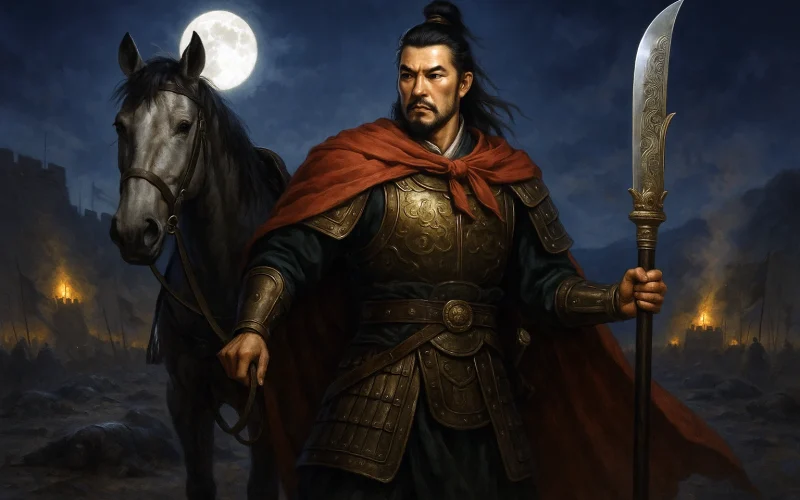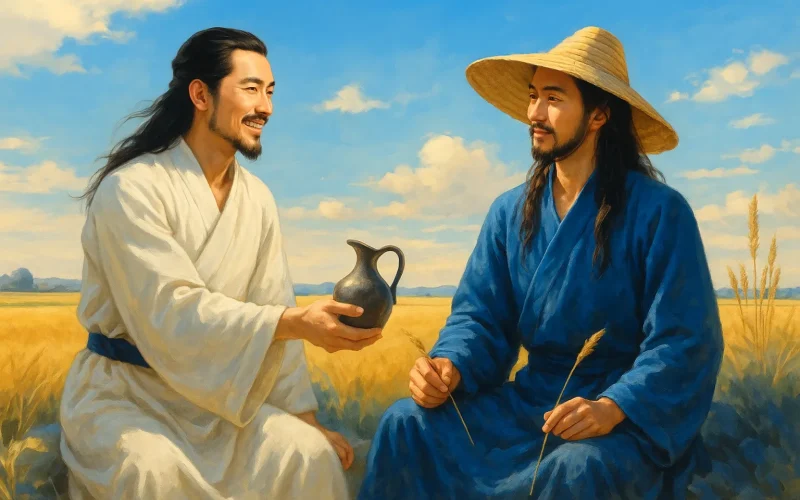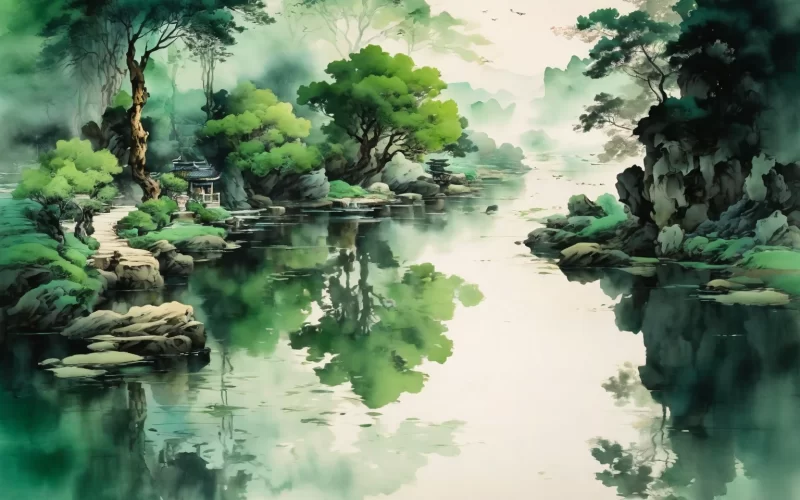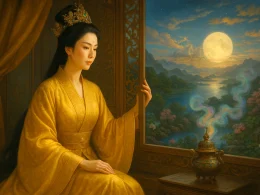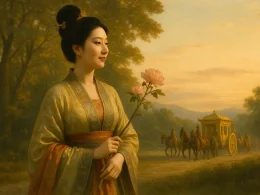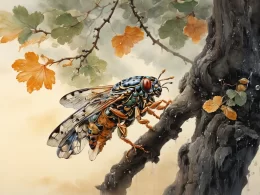The general’s horse is saddled with white jade;
The moon turns cold after the battle’s fought.
The iron drums on city walls still sound;
The golden sword in its sheath is with blood stained.
Original Poem
「军行」
李白
骝马新跨白玉鞍,战罢沙场月色寒。
城头铁鼓声犹震,匣里金刀血未干。
Interpretation
This poem stands as a heroic battle hymn within Li Bai's frontier repertoire, epitomizing the enterprising, martial confidence of the High Tang era. With his characteristic romantic brushwork, the poet focuses on the moment just after a fierce battle, using several evocative snapshots to portray a valiant general of illustrious feats, celebrating the invincible might of the Tang forces.
First Couplet: "骝马新跨白玉鞍,战罢沙场月色寒。"
Liú mǎ xīn kuà báiyù ān, zhàn bà shāchǎng yuèsè hán.
Astride his bay with new white-jade saddle; The battlefield lies cold beneath the moon after battle.
The couplet opens with fine-brush strokes, like a sequence of film shots. The "bay" (a red horse) paired with a "white-jade saddle" presents vivid color and noble grandeur, suggesting the general's high status and his spirited, confident bearing before combat. However, the next line shifts abruptly: "after battle" pulls the timeline to the present, and "moon lies cold" is the pivotal phrase. This "cold" is both the physical chill of the frontier night and an abstract distillation of war's cruelty; it uses the coldness of heaven and earth to contrast the unquenched fervor in the hero's heart, creating a uniquely solemn and desolate atmosphere post-battle.
Second Couplet: "城头铁鼓声犹震,匣里金刀血未干。"
Chéng tóu tiě gǔ shēng yóu zhèn, xiá lǐ jīn dāo xuè wèi gān.
The wall-top iron drums still seem to thunder; In its sheath, the gilded blade's blood remains wet.
This couplet is a stroke of genius, pushing the tension of the "just ended" moment to its peak through auditory and visual dimensions. "Still seem to thunder" is an auditory continuation, an aftershock of the battle's intensity, filling the static scene with a reverberating force that hints at the fight's ferocity. "Blood remains wet" is a visual close-up, the most impactful detail. It is not only direct evidence of the battle's brutality but also a medal of honor attesting to the general's prowess and numerous triumphs. This undried, warm blood starkly contrasts with the previous couplet's "cold moon," concentrating the hottest temperature of heroism.
Holistic Appreciation
This poem is a paradigm of "instantaneous narrative" in High Tang frontier poetry. The poet captures the most pregnant moment—"just after battle"—and through four tightly connected images (mounting the horse, the moonlit battlefield, the echoing drums, the bloody blade), condenses the entire process from engagement to fierce combat to victory. Without directly depicting the battle itself, the poem uses the pre-battle elite gear, the post-battle harsh environment, the lingering drumbeats, and the undried blood to fully engage the reader's imagination in reconstructing the fierce clash. This technique—using results to imply process, silence to suggest sound, and aftermath to convey climax—allows the poem to burst with boundless heroism and power within just twenty-eight characters, perfectly showcasing the "astounding wind and rain" artistic charm of Li Bai's poetry.
Artistic Merits
- Masterful Capture of the Instant: The poet acutely seizes typical scenes the very instant the battle concludes (drums still echoing, blood still fresh), using this moment to radiate the entire event, infusing the poem with dramatic tension.
- Texture and Contrast in Imagery: The elegance of the "white-jade saddle" contrasts with the desolation of the "cold moon"; the roar of the "iron drums" contrasts with the viscosity of the "gilded blade's blood." These multi-layered contrasts in texture, color, and temperature build a sublime poetic realm that is both real and transcendent.
- Skillful Use of Indirect Depiction: Employing a technique of hinting at the moon by drawing clouds, the poem avoids direct description of the general's combat actions, instead shaping a brave, noble, victorious hero through his steed, equipment, environment, and post-battle details.
- Highly Condensed Language: In four lines and twenty-eight characters, not a word is superfluous. Verbs like "astride" and "thunder" are highly dynamic, while adjectives like "new," "cold," "still," and "un" precisely capture the state of that specific moment, demonstrating extreme linguistic efficiency.
Insights
This poem resonates like a forceful war drum, pulsating with an undying heroic spirit. It teaches us that true strength lies not only in the glorious moment of victory but also in the unyielding will and vitality demonstrated after the fierce fight—in the lingering power of the drums and the undried blood on the blade. This spirit transcends its era, inspiring us to maintain that heroism to "charge into battle," the courage to "fight to the end," and the confidence of "holding victory" in any of life's "battles"—whether facing challenges, adversity, or pursuing ideals. Furthermore, by placing the individual hero against the backdrop of a powerful nation, the poet reveals that personal value and glory are often realized and elevated through connection to a greater cause.
About the poet

Li Bai (李白), 701 - 762 A.D., whose ancestral home was in Gansu, was preceded by Li Guang, a general of the Han Dynasty. Tang poetry is one of the brightest constellations in the history of Chinese literature, and one of the brightest stars is Li Bai.






